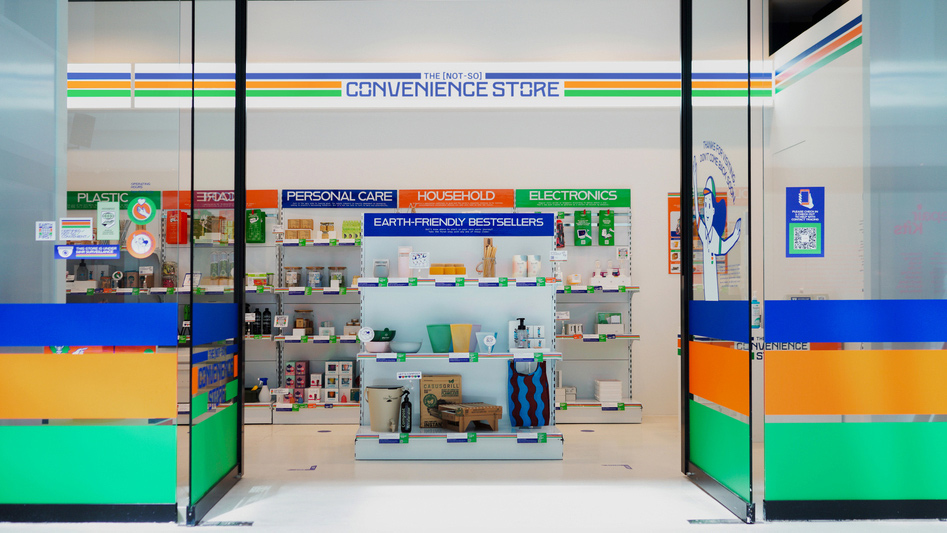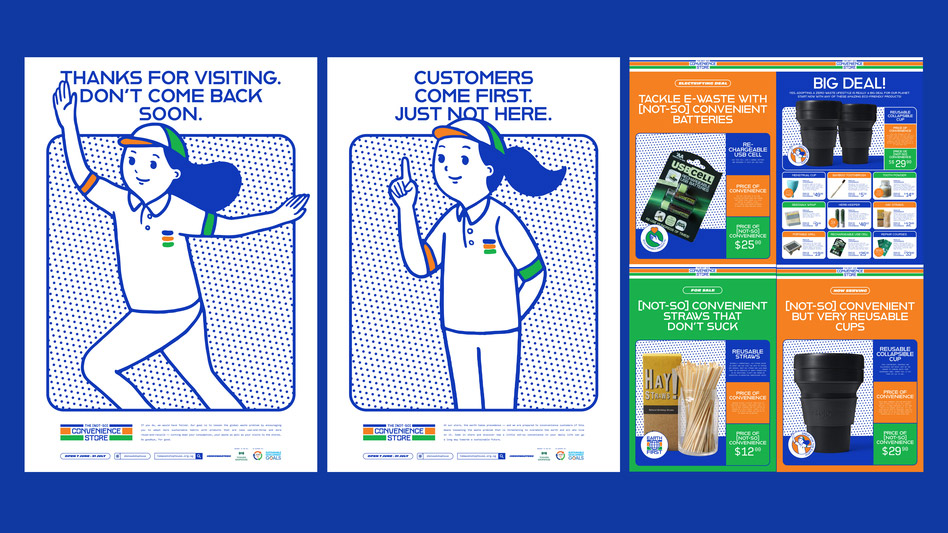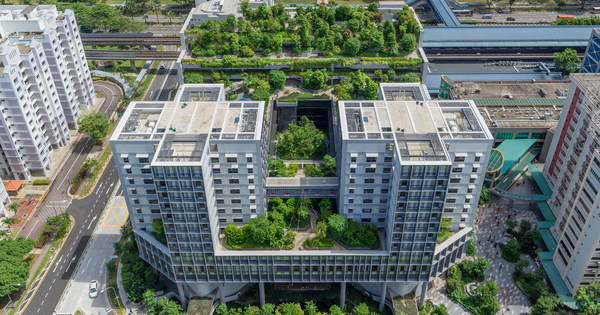DESIGN OF THE YEAR 2020
The [Not-So] Convenience Store
Designer
Kinetic Singapore
CONTACT
[email protected]
With its fluorescent-lit interiors, catchy jingle playing in the background and a shopfront wrapped in cheery corporate stripes, it looks like yet another convenience store. But The [Not-So] Convenience Store is anything but. Instead, it is a tongue-in-cheek exhibition of a tired but inconvenient truth — our culture of convenience is costing the environment.
Displayed inside the store are shelves of sustainable alternatives to convenient everyday products. From metal straws to rechargeable batteries and reusable menstrual cups, each comes with a price tag — one that displays the true price of convenience as paid by the environment. The playful twist happens all around the store: a cashier dispensing “notes” on how to live more sustainably; a freezer repurposed as a recycling bin to “Put a Freeze on E-waste”; and a photo wall featuring “Employees of the Month” who are actually sustainability champions and influencers.
A visit to The [Not-So] Convenience Store shakes up one’s perspective on how mindless consumption and the pursuit of convenience contribute to waste and an unsustainable lifestyle. Or as a poster inside cheekily declares: “Thanks for visiting. Don’t come back soon.”
About the Designer
Of all the adjectives to describe Kinetic Singapore, “indie” would probably sum them up best. It reflects not only their status as a fully independent creative agency but also their quirky house style. Their refusal to be boxed in sees their works span design and advertising, digital and events, and even retail and curatorial at one point. A fierce champion of all things local, they have put the “little red dot” on the global design stage with over 500 awards and counting.
The lead designer for the project was Astri Nursalim, a creative director at Kinetic Singapore, who entered the industry in 2011 and joined the company two years later. She is an “accidental designer” who jumped into the profession thinking all one needed to do was draw. She was pleasantly surprised that design encompasses so much more and has never looked back since. Astri’s work has received recognition at international creative shows like the D&AD Awards, Cannes Lions Awards, The One Show, Young Guns, Tokyo Type Directors Club as well as the Singapore Creative Circle Awards.
DESIGNER
Kinetic Singapore
SUSTAINABILITY PARTNER
Temasek Trust Ltd / Temasek Shophouse
DESIGNER
Kinetic Singapore
SUSTAINABILITY PARTNER
Temasek Trust Ltd / Temasek Shophouse
1A DOUBLE TAKE
This is no convenience store but an exhibition on how the culture of convenience gives rise to our wasteful and unsustainable habits.
(Photo by Kinetic Singapore)2ENVIRONMENTAL COSTS
The exhibition showcases various everyday products with tags outlining the environmental problem as well as two prices. The “Price of Convenience” shows what Earth is paying for our wasteful habits, while the other shows the price of the sustainable alternative on display.
(Photo by Kinetic Singapore)3CHEEKY APPROPRIATION
The design of the exhibition adheres closely to that of convenience stores, from the branding graphics to the way products are displayed. It creates an immersive environment for the message to shine through.
(Photo by Kinetic Singapore)4CHEEKY APPROPRIATION
The design of the exhibition adheres closely to that of convenience stores, from the branding graphics to the way products are displayed. It creates an immersive environment for the message to shine through.
(Photo by Kinetic Singapore)5SPREADING THE WORD
The exhibition was originally commissioned in 2019 for the inaugural exhibition of the Temasek Shophouse, a social impact hub in Singapore. Two years later, it popped up at the National Design Centre.
(Photo by Kinetic Singapore)6SPREADING THE WORD
The exhibition was originally commissioned in 2019 for the inaugural exhibition of the Temasek Shophouse, a social impact hub in Singapore. Two years later, it popped up at the National Design Centre.
(Photo by Kinetic Singapore)7A LIGHT TOUCH
Mindful of how the public might have already been overwhelmed by the same messages about sustainability, the designers sought out a more subtle and unexpected way to communicate the issue instead.
(Photo by Kinetic Singapore)8A LIGHT TOUCH
Mindful of how the public might have already been overwhelmed by the same messages about sustainability, the designers sought out a more subtle and unexpected way to communicate the issue instead.
(Photo by Kinetic Singapore)9(L-R): Creshelle Padilla, Jennifer Wiriawan, Steven Koswara, Catherine Phua, Astri Nursalim, Fely Anne Ang, Pann Lim and Gian Jonathan
(Photo by Ivan Loh, pigscanfly photography)Insights from the Recipient
Kinetic Singapore (KS): In recent years, sustainability has been a hot topic. Every socially conscious brand, personality and well-meaning organisation has spoken up on it, whether through marketing and advertising efforts, community outreach or their social media channels. Of course, this is a good thing given the varied environmental problems we face now, and which, sadly, our future generations will inherit. But the sheer volume of communication on this issue can be overwhelming. It becomes a blind spot as the public gets used to the same message, delivered again and again in the same top-down manner.
In Singapore, we are so used to national campaigns that tell us what to do — from stopping at two kids, to speaking Mandarin, to being gracious — that there is always a danger of educational messages being dismissed by a jaded audience. This is not to say that such campaigns have not been effective. It’s just that we recognise the times have changed, and perhaps a more subtle delivery would be more palatable to the audience of today. Before we had our eureka moment, we already knew we wanted to take a different approach, one that would hopefully catch people’s attention instead of turning them off.
KS: The [Not-So] Convenience Store is a perfect example of form following function. While we wanted a different kind of educational exhibition, it was really the concept that informed the final form. Addressing the problem of waste starts with tackling our wasteful habits, which in turn requires a re-examination of our mindset. As a nation used to prizing speed and efficiency, weaning Singaporeans off the culture of convenience can be an uphill task. Once we recognised that zero waste from the get-go was impossible, we aimed to nudge people towards taking small sustainable steps instead.
In this regard, the familiar guise of the ubiquitous convenience store is a great advantage. Everybody knows what it is and what it stands for, ensuring that our conceptual twist can be easily grasped. As compared to the more formal setting of conventional exhibition formats, the reassuringly familiar set-up of The [Not-So] Convenience Store makes the sustainability message more accessible right away.
KS: The [Not-So] Convenience Store is ultimately an educational exhibition. We had to weave in informational elements while staying true to the guise of a convenience store. Rather than posters, we decided to put the price tags to good use. Firstly, the price tags were scattered throughout the store, maximising their chances of being read. Secondly, they allowed us to share the true reason why we were promoting that particular product.
Each price tag shows two prices: the Price of Convenience and the Price of [Not-So] Convenience. The former shows the price the Earth pays for our wasteful habits, and here we feature bite-sized information about the relevant environmental problem. The latter is the price the visitor pays for taking up the more sustainable alternative, which is the retail price of the product featured. The information on the price tags pointed to the diversity and scale of the environmental crisis, which has hopefully created a sense of urgency for immediate action.
KS: We have been very encouraged by the response to The [Not-So] Convenience Store. We didn’t spend anything on media buys, but the novelty of the exhibition caught the attention of Singapore news and community websites such as CNA, TODAY and Mothership. There was healthy chatter on social media too, including someone from as far away as Croatia who wrote, “I’d love one here in Zagreb”. The [Not-So] Convenience Store also enjoyed the support of more than two dozen local brands which provided the products for display and helped promote the store through their social media channels. We are happy to learn that the store has played a part, no matter how small, in building an eco-community and in supporting local.
KS: There is no universal band-aid, every project is different and comes with its own set of challenges, which requires a customised solution. However, we do believe in the power of surprise. This means that we try to do things in a way that has not been done before, as far as possible. For inspiration, we often look outside of our fields, while staying curious and open to life.
It helps that we have a very flat organisational structure, and everyone is free to contribute their thoughts no matter his or her position. A typical brainstorming session usually sees plenty of wisecracking and jokes. Perhaps it is this freedom and camaraderie – knowing you won’t be laughed at, only laughed with – that emboldens us to come up with seemingly far-fetched ideas. We then carefully hone these ideas into works that are as effective as they are creative.
Citation
Jury Citation
Nominator Citation
Yvonne Tay
Director
Temasek Trust (operator and manager of Temasek Shophouse)
The [Not-So] Convenience Store is far from your typical convenience store. Instead, the exhibition is a tongue-in-cheek reprimand that our culture of convenience is killing the Earth.
Visitors will find shelves of not-so convenient but sustainable alternatives to everyday products, ranging from metal straws and beeswax food wraps to menstrual cups. Each is accompanied by a price tag carrying information on how it can help address the environmental cost of its less sustainable counterpart. While the items are not for sale at the shop, the QR codes also link visitors to the respective product pages should they wish to buy them. Meanwhile, a specially composed jingle about zero waste plays softly in the background.
The Jury applauds the originality of the concept, and its spot-on identification of the key problem around waste – the culture of convenience. The project is a strong vehicle for the message of sustainability, which comes across efficiently without being preachy. With convenience stores being such a ubiquitous feature around the world, the concept has massive potential to expand and educate larger audiences.
Temasek Shophouse is a social impact hub that seeks to serve the common good. Kinetic Singapore was engaged to create a public exhibition at the then-newly opened hub to raise awareness of sustainability in conjunction with World Environment Day in June 2019.
This exhibition defied the convention of a typical convenience store by presenting sustainable alternatives to the everyday, seemingly convenient products. In doing so, the “store” highlighted how our culture of convenience – our high dependence on single-use plastics, low recycling and reuse habits, and constant desire for new electronic gadgets – has contributed to global warming and climate change. We also partnered with eco-conscious businesses and social enterprises to provide their sustainable solutions – making this a true community project.
Our hope was to offer a creative platform to educate and inspire the general public about the sustainable solutions available in Singapore and to work towards adopting a zero-waste lifestyle. The launch of The [Not-So] Convenience Store not only increased public footfall to the Temasek Shophouse, it also got them interested in our initiatives and to explore the newly refurbished heritage shophouse.













